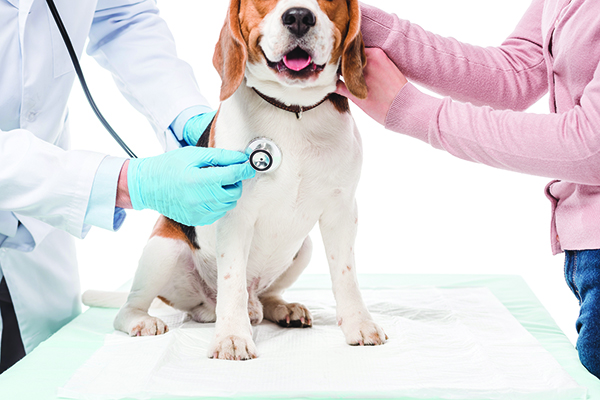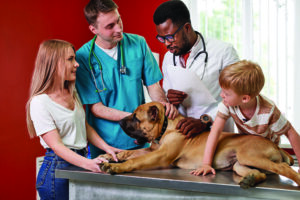
Veterinary care sure is expensive, isn’t it? And it’s even more so when we sabotage our own pet’s care.
Think that sounds crazy? You figure nobody would undermine the very approach they’d just paid top dollar for? Well . . . Have you ever:
* Been told to give your dog crate rest, but then you gave in and let her out because she barked all the time?
* Told the vet there have been absolutely zero dietary changes – but forget that the new Bark Box just came on Tuesday filled with new treats the dog gobbled up?
* Decide not to use that ointment the vet gave you because your dog kept licking it off?
* Cut the number of ear cleanings in half because your dog hated it so much?
Owners often spend considerable time researching veterinarians to be sure they are seeing the best practitioners, to be certain they’re doing right by their dogs. It’s a shame when the same owners fail to recognize that the success of that veterinary work is sometimes in their very own hands! Even the best veterinarian in the world can’t help a dog whose owner didn’t didn’t give the vet the full picture, didn’t quite understand the vet’s instructions, or altered the treatment plan at home.

In contrast, being an incredibly prepared, attentive, and conscientious client can help you get much better value out of any vet trip. Here’s how:
* FIRST, GET YOUR STORY STRAIGHT. There is a lot of hemming and hawing at the vet. “Um, let’s see, maybe it was last Thursday when I first felt that lump because I remember Aunt Sally was visiting – no, wait, that was the kitty’s lump…” That uncertainty leads to a more tangled (and expensive) path to diagnosis.
Before you head to the vet, take out a pen and a pad of paper. Ask yourself all of the questions you know full well the vet is going to ask you, such as:
• What happened?
• When exactly did it start? Since onset, has it gotten better or worse?
• Has it ever happened before?
• Could he have gotten into something?
• Any other changes?
• How’s his behavior otherwise?
• Anything new in your routine?
• Any travel?
• Any new foods? This includes not just the main diet but any treats or foods snuck to the dog by family members.
• Any other pets at home showing similar signs?
• And so on.
If you’re heading to an emergency clinic, and will be seeing a vet who’s not familiar with your dog’s history, write down the exact name of any current medications, because “Well, it’s an oval and I’m supposed to give it twice a day” is not super helpful. Or, bring the bottle with you!
In the heat of the moment, when pressed for answers, it’s easy to forget things. That’s okay! Just plan ahead; before the appointment, write down the important stuff. Bring your notes, and use them to give the vet a clear, concise picture of what’s happening.
* LISTEN TO THAT EXPENSIVE ADVICE. Once you’ve given that overview to the vet, it’s time for you to stop talking and listen. In fact, listen hard. A heck of a lot of trouble arises because people find they get home from the vet and think, “Wait, what did she say?” Then they guess.
Sometimes your head is spinning with worry at the vet, so it’s hard to take in information. Still, you typically have three shots at it: The first is when the vet talks to you; the second is when the discharge nurse goes over the instructions; and the third is when you look over what’s written on the paperwork. Oddly enough, people often space out during all three of those opportunities, even when this is exactly what they are paying so handsomely for.
Don’t do that. Even if you are stressed out about your dog, this is the time to focus.
* CALL BACK IF YOU’RE CONFUSED. I’m in a bunch of dog-related Facebook groups, which is why I can report to you that it is a very common thing to post something like this: “I went to the vet and they suggested X, Y, and Z. That seems wrong to me. What do you all think?” A cascade of advice follows from strangers on the internet, often contradicting the plan given by an actual veterinary professional who’s examined the dog and taken a detailed history.
If you’re confused by something the vet said, or if you actually disagree and are planning on not following the advice, just tell the vet right then and there! That way she has a chance to either convince you or come up with an alternate plan.
Perhaps you didn’t think of things you wanted to ask until you were on your way home, or after you got home. No worries! Call the veterinary hospital and ask for some clarification. A good vet will much prefer having that conversation rather than having the dog she sent off with a great treatment plan get nowhere near what he needs. Just keep in mind that your vet will likely not be available when you call, so just leave a detailed message up front so she can call you back with an answer.
* DO NOT IMPROVISE. The vet does not give you extra instructions just for the fun of it. If he says to give the meds on an empty stomach, don’t decide it’s fine to do it at mealtime because that’s when it’s convenient for you. Yes, that steroid dosage chart sure is complicated – three, then two, then one, then every other day – but don’t decide “nobody could keep up with that” and come up with your own easier system. And don’t be me, 15 years ago, making your dog’s slight fracture take four months to heal instead of six weeks because it seemed impossible to keep her from playing with the rest of the pack.
I know this stuff is hard, and you don’t have time for all of this extra, unpleasant dog stuff. Plus the dog hates it all, which makes it worse. It feels better to skip it, I know. Don’t!
HELP YOUR VET HELP YOUR DOG
Instructions matter. These details may not seem important to you, but I have a tiny little reminder for you: You don’t know enough to know why they are important. The vet does, and that’s why you pay her.
Of course, there will always be frustrating expenses – like diagnostic tests that reveal no answer or treatments that don’t help. You can’t do anything about that, but being a great client can help you get the most out of every dollar spent, and help your dog get better faster.






I would make another suggestion: when possible take someone with you to the vet. Two sets of ears are better than one! (This is also true for people doctors. )
Where can I get vet insurance?
I have PetPlan. You can go online and look at different ones. This one was best for me.
Thank you! I worked for my vet for 12 years and this hits home big time! Please pay attention!! Ask questions, and then LISTEN to the advice.
Great advice.
Since my dog had an injury and had to have not one but two surgeries starting in March, I have written down all of my questions, all of Callie’s problems etc. because her Vet does only curbside because of Covid-19. This often prompted the Vet, and Orthopedic surgeon, to come to my car and answer my questions or their need to ask more, which I appreciated.
I hate that the Vet is still doing curb side but understand their concern. Maybe someday soon it will all change. I hope!
I often email my vet after a visit with my questions. I am able to take my time writing my questions clearly and add any information I may have forgotten. The best part is I get answers in writing that I can save and review as needed.
Have you even been told by a vet to keep your dog quiet, but then refuse to give you a sedative for that hyper-active dog.
Have you even be prescribed an (expensive) ointment for your pet that made absolutely no difference -or worse
Been prescribed expensive antibiotics for a growth that was not a bacterial infection? (Well he even refused to lance it. Cleared up eventually because the other dog spent lots of time licking it for her)
Have a vet refuse to give your dog an emetic for that cycad seed that he said wouldn’t hurt the dog (and he didn’t believe you anyway) and when you absolutely insisted and great lumps of cycad seeds came out not apologise!
Have you ever paid big bucks for as medication that the vet prescribes for your
dog, then find you can buy it cheaply over the counter at the chemist?
Sorry to burst your bubble, but be very very wary of Vets you do not know,
A good Vet is a think of beauty and a joy forever, but bad vets are tragedies waiting to happen,
A great vet and vet techs are worth their weight in gold! Treat them as such and follow these instructions to help them help your fur babies. Great article.